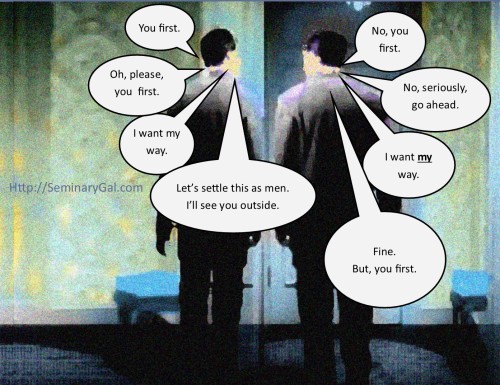 John 13:31 When [Judas] was gone, Jesus said, “Now is the Son of Man glorified and God is glorified in him. 32 If God is glorified in him, God will glorify the Son in himself, and will glorify him at once. 33 “My children, I will be with you only a little longer. You will look for me, and just as I told the Jews, so I tell you now: Where I am going, you cannot come.”
John 13:31 When [Judas] was gone, Jesus said, “Now is the Son of Man glorified and God is glorified in him. 32 If God is glorified in him, God will glorify the Son in himself, and will glorify him at once. 33 “My children, I will be with you only a little longer. You will look for me, and just as I told the Jews, so I tell you now: Where I am going, you cannot come.”
There was a test Jesus just passed. There would be a few more before the Crucifixion (even if we don’t usually think of them that way). But for now, Judas was gone to do quickly the evil work of betrayal of the Son of God and Jesus hadn’t done anything that would interfere with God’s plan. Jesus was a willing and humble servant of His Father in heaven, having passed a test of self-will by His continuing onward to the Cross.
He now begins the Upper Room Discourse (a farewell address) to His faithful disciples in order to prepare the remaining 11 for what was going to unfold over the next 15 hours or so while they are still With Christ in the Upper Room.
I remember a time I had graduated from Purdue University and was preparing to go down to Texas A&M for further studies. I said my goodbyes. And then over a period of the next couple of days, I saw many of those people again and again, each time having more tearful goodbyes, and then finally a few of them said, “Would you get out of here already? I’m tired of saying goodbye to you only to see you again so soon.”
For the disciples, this was not a tearful goodbye (though later we’re told, they’ll grieve).
The disciples didn’t understand enough right now to cry. They didn’t fully comprehend that Jesus would be going away and would not return to them without first experiencing death.
There is a great irony in that pathway to Jesus’ restored glory was the shame of the Cross.
Now that Judas is gone, the events leading to Jesus’ crucifixion were an inevitable domino effect (so long as Jesus obeyed the Father’s will, that is). It was a path of no return because it’s the whole reason Jesus came. No turning back now. So He looks ahead:
Jesus says, “31…Now is the Son of Man glorified and God is glorified in him. 32 If God is glorified in him, God will glorify the Son in himself, and will glorify him at once.”
I won’t often ask you to look at verbs because grammar scares the socks off many and bores most of the rest. But there are some things I want us to see:
- “Now IS” the time and “God IS glorified” in verse 31 (both present verbs). Now that Judas is gone, the glory is already happening. It’s a done deal because of the inevitability of the Cross for Jesus.
- More verb stuff: the Son of Man and God are “passively” glorified which means that the Son is glorified by the Father. The Father is glorified by the Son. Kind of a swap in that they’re glorifying one another. But it’s more than that: the glory is increasing because Jesus is faithful. So picture the expanding universe or a puddle expanding because more paint is poured into it.
- Now take a really deep dive look at the second part of verse 32 (the first part missing in some of the old Greek manuscripts and begins with IF, but carries no doubt that “God is glorified in him”). The verbs change to a future tense: God WILL and WILL…at once! The glory increases both now and later. You see, after the Cross, God will be actively glorifying Jesus…because of the Cross. Why glory instead of shame? (Stick with me here, I know it seems complicated.) Because the magnitude of the love and the grace of God was displayed for all creation to see in Jesus’ perfect sacrifice. Jesus was faithful and God received glory from His death for our sins. I know it sounds kind of bizarre, but it shows how much God loves us (His image bearers)! If we don’t focus on Jesus’ death itself and how it happened, but rather on the love demonstrated in it, we can see how great the Father’s love for us truly is! He sees His image in us and as we’re rescued, His glory increases.
- Therefore, God goes further and restores all of Jesus’ former glory plus some because now, there’s even more glory to go around.
Maybe it seems like a complicated nuance to us, but it wasn’t to Jesus.
Knowing that God was going to glorify Jesus and be glorified by His actions was actually the driving factor of Jesus’ going to the Cross.
We go really wrong when we think that we’re so amazing that Jesus came to die so that He could save me or you. Jesus came to die because that was the pathway to God’s increasing glory. He was sent on a rescue mission to save God’s image from a hell-bound journey for all mankind. Jesus would do it by the Cross. There is no worth we bring to the table. All we bring is sin. So it’s no nuance that the glory ahead in restoring God’s image bearers propelled Jesus to the Cross. It’s not at all about us. It’s all about Him and His glory.
* * *
Give it Up for Lent: A sense that we deserve to be saved
Put it On for Lent: True sense of our worth found only in Christ and His forgiveness
For further thought:
- Jesus says in John 13:33 (above) that He already told the Jewish leaders, “Where I am going, you cannot come”. What was their response? Read John 7:34 You will look for me, but you will not find me; and where I am, you cannot come.” John 8:21 Once more Jesus said to them, “I am going away, and you will look for me, and you will die in your sin. Where I go, you cannot come.”
- The full passage in John 7 states that some of the listeners respond by saying “This man is the Prophet” ( v 40) and “He is the Christ” (v 41), or even the temple guards acknowledge “No one ever spoke the way this man does” (v 46). Notably in verse 50, Nicodemus tries to help Jesus by insisting upon the leaders’ following Jewish law.
- But by the time we get to John 8:21 and the verses following, the Jewish leaders to whom Jesus is speaking are explicitly told they will die in their sins because of a persistent unbelief regarding who Jesus is.
- The disciples were told they could not follow now but in a few verses, Peter will be told he will follow later (John 13:36).
- What is the key difference between the disciples, the listeners who responded, and the people who will die in their sins?
* * *
You can receive these devotional studies in your email (Monday through Saturday during Lent) by entering your email address on the SeminaryGal.com home page in the space provided in the sidebar. Let’s meet With Christ in the Upper Room.

 There are times it’s helpful to rewind and replay something to see the most pertinent scenes again. Like when watching a favorite movie or some sort of thriller in which there are crucial scenes on which the entire plot turns. This is one of those scenes
There are times it’s helpful to rewind and replay something to see the most pertinent scenes again. Like when watching a favorite movie or some sort of thriller in which there are crucial scenes on which the entire plot turns. This is one of those scenes  And yet, what do we see here? Jesus was setting an example by continuing to give last chances for Judas and opportunities for the rest of the disciples to learn what it means to serve others. To love the brethren, yes, but also what it means to love our enemies.
And yet, what do we see here? Jesus was setting an example by continuing to give last chances for Judas and opportunities for the rest of the disciples to learn what it means to serve others. To love the brethren, yes, but also what it means to love our enemies. John 13: 9 “Then, Lord,” Simon Peter replied, “not just my feet but my hands and my head as well!” 10 Jesus answered, “A person who has had a bath needs only to wash his feet; his whole body is clean. And you are clean, though not every one of you.” 11 For he knew who was going to betray him, and that was why he said not every one was clean.
John 13: 9 “Then, Lord,” Simon Peter replied, “not just my feet but my hands and my head as well!” 10 Jesus answered, “A person who has had a bath needs only to wash his feet; his whole body is clean. And you are clean, though not every one of you.” 11 For he knew who was going to betray him, and that was why he said not every one was clean. Stubbornness and serving are incompatible.
Stubbornness and serving are incompatible.
 John 13:2 The evening meal was being served, and the devil had already prompted Judas Iscariot, son of Simon, to betray Jesus. 3 Jesus knew that the Father had put all things under his power, and that he had come from God and was returning to God; 4 so he got up from the meal, took off his outer clothing, and wrapped a towel around his waist. 5 After that, he poured water into a basin and began to wash his disciples’ feet, drying them with the towel that was wrapped around him.
John 13:2 The evening meal was being served, and the devil had already prompted Judas Iscariot, son of Simon, to betray Jesus. 3 Jesus knew that the Father had put all things under his power, and that he had come from God and was returning to God; 4 so he got up from the meal, took off his outer clothing, and wrapped a towel around his waist. 5 After that, he poured water into a basin and began to wash his disciples’ feet, drying them with the towel that was wrapped around him. In the Greek language, it has a double meaning. It means both that He loved them to the very end of His days as well as He loved them to the fullest extent possible, which for Jesus, the Son of God, is a lot.
In the Greek language, it has a double meaning. It means both that He loved them to the very end of His days as well as He loved them to the fullest extent possible, which for Jesus, the Son of God, is a lot.
